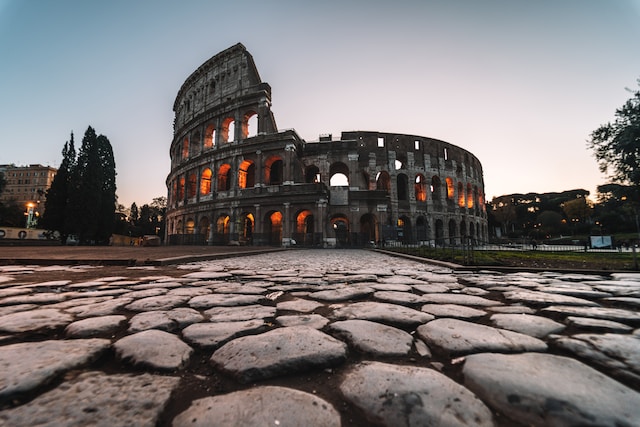While history and mythology may seem similar in certain aspects, they are fundamentally different. History is the collection of factual events that have occurred over time, whereas mythology consists of stories and beliefs that are unverifiable or based on supernatural elements.
What is history?
(Photo by Federico Di Dio photography on Unsplash )

History is the study of past events, particularly those that are significant to humanity’s development. It involves analyzing and interpreting various sources such as written records, artifacts, and oral traditions. By studying history, we gain a deeper understanding of our present world and how it came to be.
One of the key features of history is its basis in factual evidence. Historians strive to uncover accurate information about past events by consulting primary sources like eyewitness accounts or official documents. This process can sometimes be challenging due to biases or gaps in these sources.
Another important aspect of history is its focus on human behavior and societal structures. Historians examine how individuals and groups have interacted with each other throughout time, as well as how political, economic, and cultural systems have developed over time.
History provides us with valuable insights into our shared human experience while also helping us make sense of contemporary issues facing society today.
What is mythology?
(Image by Gordon Johnson from Pixabay )

Mythology is a collection of stories or legends that explain the beliefs, customs and rituals of a culture. It includes gods, goddesses and other supernatural beings who are often represented as having human-like qualities such as emotions and flaws. These myths usually involve heroic deeds, epic battles and magical powers that influence the world around us.
Myths have been used to explain natural phenomena like thunderstorms, eclipses and earthquakes for centuries. They were also used to teach moral lessons about good vs evil, love vs hate and sacrifice vs selfishness.
Every culture has its own mythology which reflects their unique history, values and worldview. Some examples include Greek mythology with gods like Zeus, Poseidon and Hera; Norse mythology with Odin, Thor and Loki; Egyptian mythology with Ra, Isis and Horus; Hindu mythology with Shiva, Vishnu and Kali among many others.
Mythical characters continue to appear in modern literature, movies and video games where they inspire creativity by providing endless possibilities for new storylines while still connecting us to our past.
History Vs. Mythology – Key differences
When it comes to history and mythology, there are some key differences that set them apart. Firstly, history is based on factual events that have been documented or recorded by reliable sources over time. On the other hand, mythology refers to stories or legends that may not be entirely accurate and have been passed down through generations.
One major difference between the two is their purpose. History aims to provide a factual account of past events while mythology often serves as a way for people to explain natural phenomena or understand cultural beliefs and traditions.
Another important distinction is in how they are treated in academic settings. History is subject to scrutiny and analysis by experts who use evidence-based research methods while mythology tends to be studied from a more literary perspective.
It’s also worth noting that history can sometimes incorporate elements of mythological storytelling such as heroic figures or legendary battles but these aspects are typically used more for entertainment purposes rather than historical accuracy.
Understanding the differences between history and mythology can help us appreciate both forms of storytelling for what they bring to our collective understanding of human experience.
Examples of history
Examples of history include documented events and occurrences that have taken place throughout time. These can be found in various forms such as written records, archaeological findings, and artifacts. One example of recorded history is the ancient civilizations of Egypt and Mesopotamia which have left behind extensive documentation of their beliefs, cultures, and daily life.
Another example is the Renaissance period which was marked by significant advancements in art, science, literature and politics. The Industrial Revolution also played a crucial role in shaping modern society as it led to widespread changes in manufacturing processes.
Historical events such as wars like WWI or WWII hold great significance because they not only impacted nations but also shaped entire generations. For instance, the civil rights movement had an enormous impact on American society during the 1960s leading to vast social changes for African Americans.
History serves as a vital tool to help us understand our past so we can learn from it to create a better future. It provides valuable insights into how societies functioned before us and how they’ve evolved over time.
Examples of mythology
Mythology is a collection of stories and beliefs that explain the origins of humans, nature, and the universe. These stories can be found in cultures all around the world, from ancient Greece to modern-day Africa.
One example of mythology is Norse mythology which includes tales of gods like Odin and Thor who have supernatural abilities and control over natural elements such as lightning. Another example is Hindu mythology which features a pantheon of gods including Shiva, Vishnu, and Brahma who are responsible for maintaining balance in the universe.
Greek mythology is perhaps one of the most well-known examples with popular stories like those about Hercules, Zeus and Medusa captivating generations for centuries. Egyptian mythology also has its fair share of fascinating tales such as myths about Ra – an important god who created himself out chaos before creating everything else.
Many Native American tribes also passed down their own unique mythologies through oral storytelling traditions. For instance, Navajo creation myths involve figures like Changing Woman and Spider Man while Maya mythology features a vast array of deities with various roles in shaping human destiny.
These diverse examples demonstrate how varied our understanding can be when it comes to explaining our surroundings.
What are types of mythology
Mythology is a complex and fascinating subject that has been studied for centuries. There are countless types of mythology, each with its unique stories and characters. Some of the most well-known types include Greek, Roman, Norse, Egyptian, and Hindu mythology.
Greek mythology is perhaps the most famous type of mythological tradition in the Western world. It features gods such as Zeus and Athena who have become household names.
Roman mythology shares many similarities with Greek mythology due to their shared history. However, Roman myths tend to be more focused on military accomplishments than their Greek counterparts.
Norse mythology was popular among Scandinavian countries and featured fierce warriors like Thor and Odin.
Egyptian mythology revolved around pharaohs as divine rulers who were worshipped alongside gods such as Ra and Osiris.
Hindu mythology centered around multiple gods including Ganesha and Shiva who represented different aspects of life.
These are just a few examples of the numerous types of mythologies that exist throughout the world. Each one reflects unique perspectives on life’s mysteries while also providing insight into ancient cultures’ beliefs about themselves and their place in the universe.
Where did mythology start?
The origins of mythology are shrouded in mystery, as it predates written history. However, through archaeological evidence and oral traditions passed down from generation to generation, we can piece together a rough understanding of where mythology began.
Many ancient civilizations had their own unique mythologies, such as the Greek gods and goddesses or Egyptian deities. These myths were often used to explain natural phenomena or cultural practices. For example, the story of Demeter and Persephone in Greek mythology explains the changing seasons.
Some scholars believe that early humans created myths as a way to understand their world and make sense of things they couldn’t explain. Others theorize that myths may have originated from religious beliefs or rituals.
Regardless of its exact origin, mythology has played an important role throughout human history. It has inspired art, literature, and even modern-day pop culture references. And while some may view it as outdated superstition, others see it as a valuable part of our collective cultural heritage.
Featured Image By – Joanna Kosinska on Unsplash








